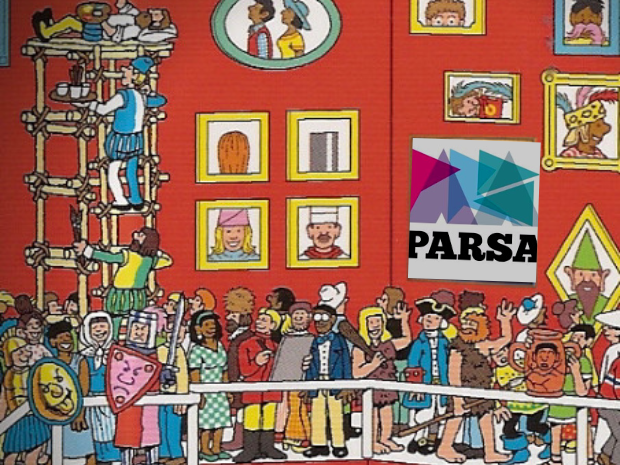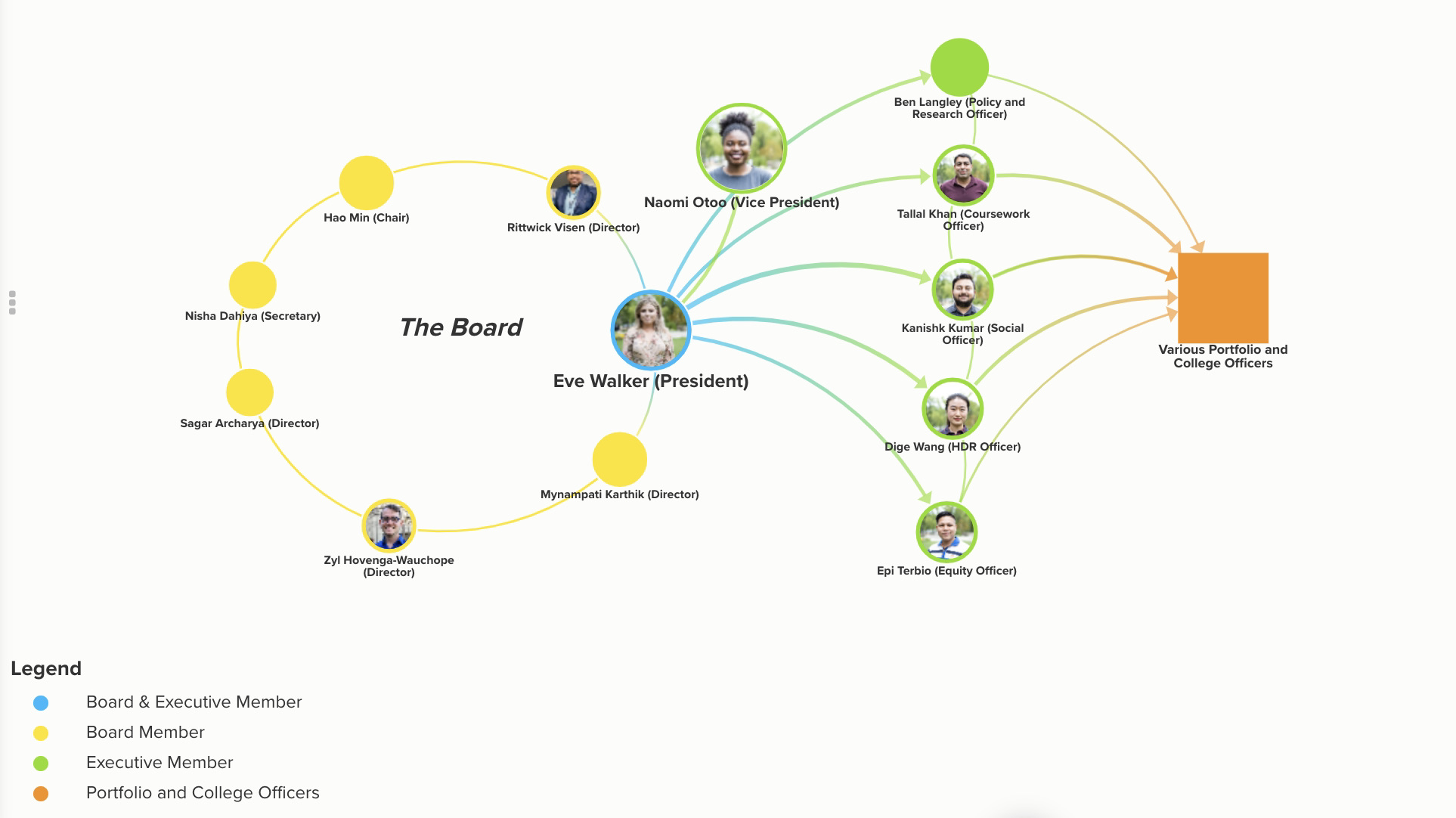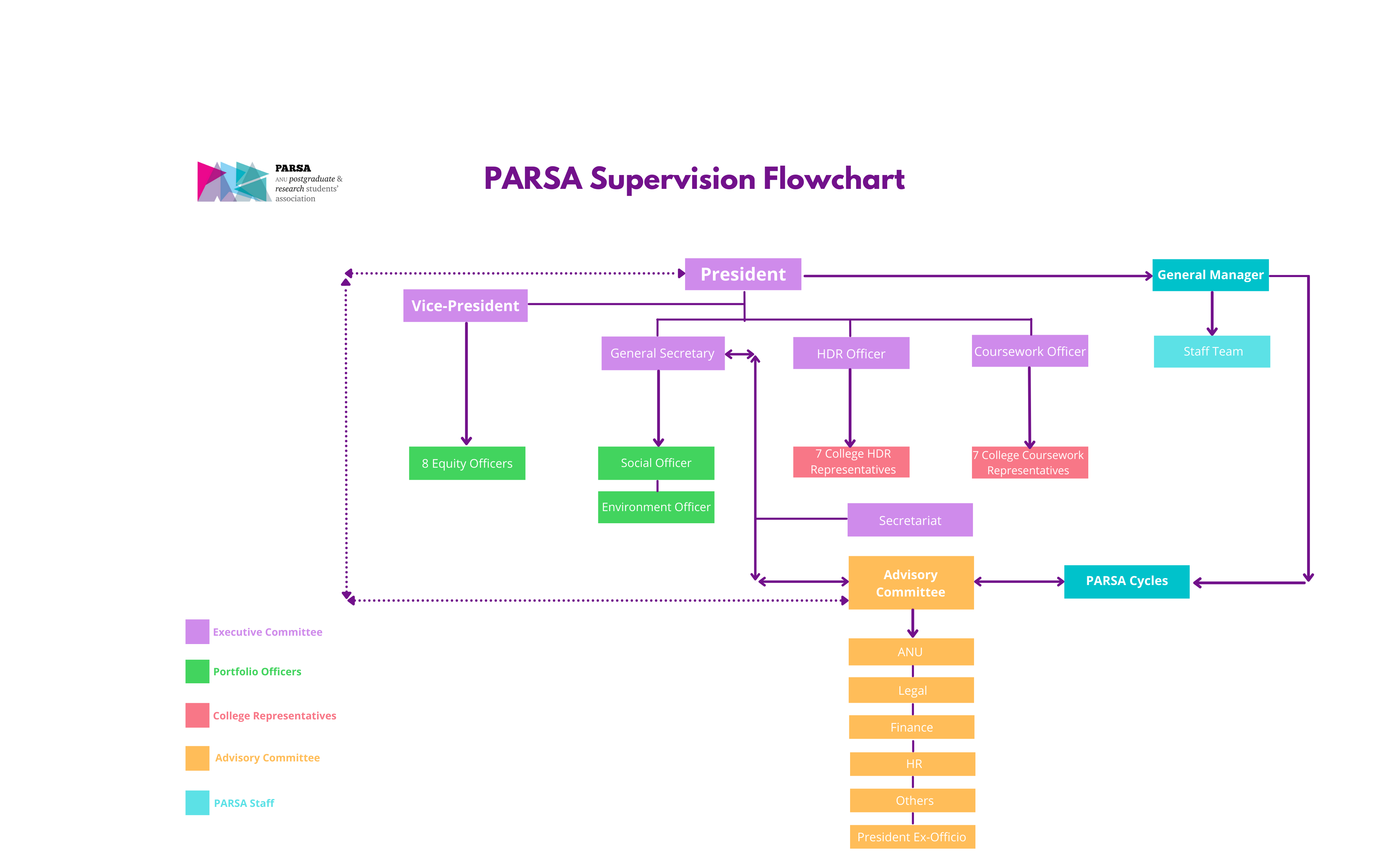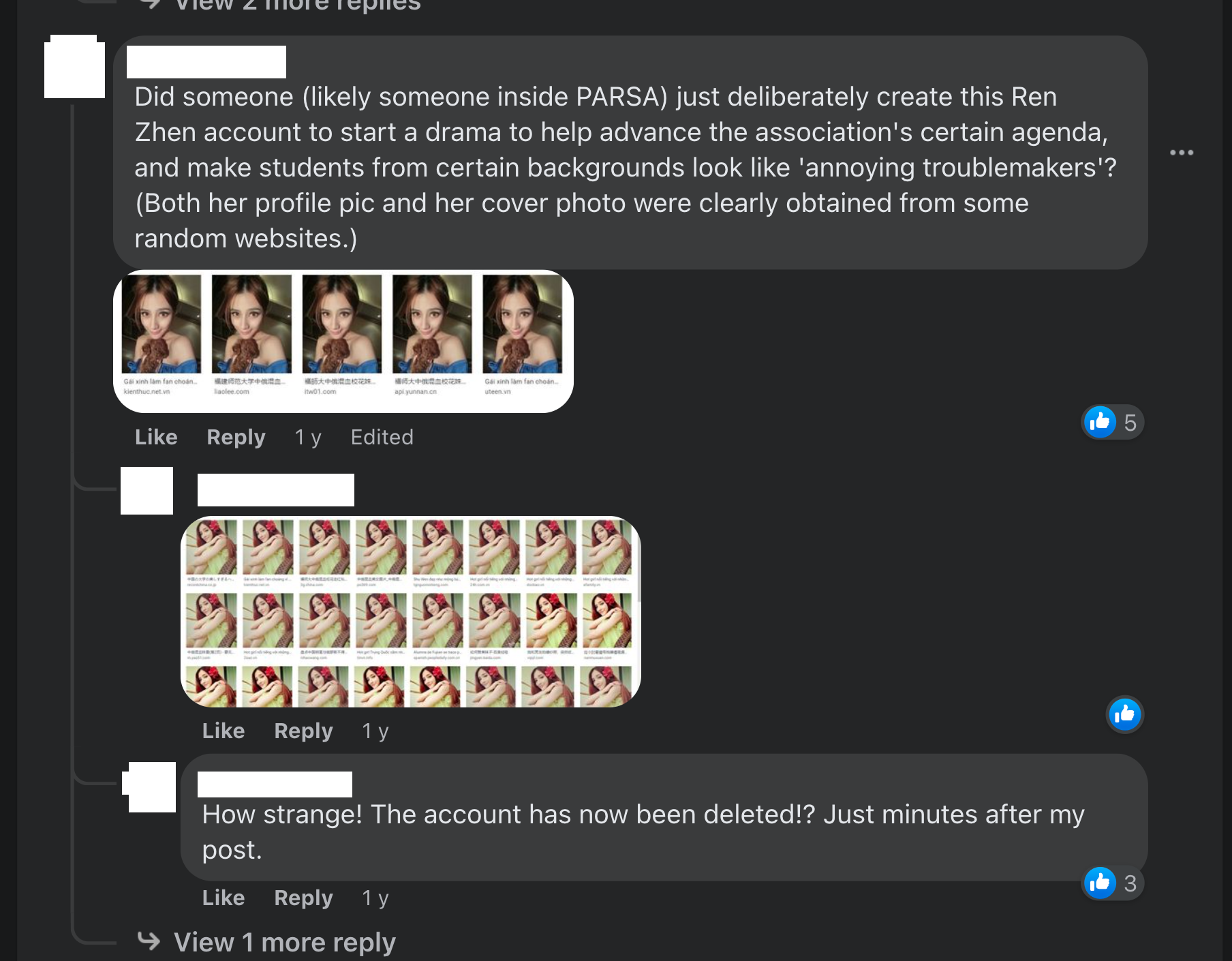Pulling the Plug: PARSA’s 62 Years of Postgraduate Advocacy Brought to an End by 2021 Infighting

By Ryan Bourke and Darlene Rowlands
Since 1960, the Postgraduate and Research Students’ Association (PARSA) has supported, advocated for, and represented ANU’s postgraduate community. Despite this, 2021 saw the state of the association change permanently during a 3 month period of public infighting between its executive and now-defunct PARSA Board.
Today, PARSA is still without a permanent President.
As PARSA attempted to rebuild through an updated constitution in May, the University announced earlier this week that it will withdraw funding from the association, citing “ongoing governance and operational issues” that have allegedly not been remedied despite “repeated opportunities” to do so in the wake of the 2021 crisis.
With six decades of postgraduate advocacy through PARSA set to come to an end – unless their petition to retain funding succeeds – Observer scoured its 2021 archives to compile a timeline of how PARSA came to face the possibility of their dissolution.
PARSA: structure and significance
PARSA supports ANU’s postgraduate and research students through services such as legal assistance, welfare and financial support initiatives, social event organisation, and advocacy.
Throughout PARSA’s pre-crisis history, ANU’s postgraduate population has notably benefitted from the association’s advocacy. PARSA has lobbied to preserve course funding, advocated for and provided emergency accommodation to students experiencing homelessness, and campaigned for action on SASH on campus.
Like ANUSA, its undergraduate counterpart, PARSA is wholly funded by Student Services and Amenities Fees (SSAF), which comprises the $150 fee paid by all ANU students at the beginning of each semester.
In 2022, PARSA’s budget – inclusive of $130,000 carried over from 2021 – came to around $1.7 million, which is just short of ANUSA’s approximate $2.1 million budget.
At the time of the 2021 crisis, PARSA’s structure consisted of two broad branches; the Postgraduate Representative Committee (PRC), and the PARSA Board.
The PRC survived the 2021 crisis. It is led by the PARSA executive, a body which includes the President, Vice President, Equity Officer, HDR Officer, and Coursework Officer. Additional PRC representatives who lead other areas of PARSA’s work may also be selected by the President to join the executive; at the time of the 2021 crisis, the Policy and Research Officer and Social Officer were also members of the executive. At the end of 2020, the Education Officer was also briefly a member of the executive before being removed.
The PRC also includes a number of Portfolio Officers and Academic College representatives underneath the executive. The PRC is elected annually by postgraduate students, with all representatives accountable to the President.
The PARSA Board was tasked with accountability and oversight of the association. As a result of the 2021 crisis, the Board no longer exists. At the time, the Board consisted of six elected members, including a Board Chair, Secretary and 4 additional Board Directors. The President held a seat on both the PRC and PARSA Board.
Importantly, the President was formally accountable to the Board at the time of the 2021 crisis, with the Board retaining the ability to remove the President if three-quarters of its members voted in favour.

PARSA Governance Structure in February 2021
In May 2022, the PARSA Constitution was amended to implement an advisory committee. Holding similar objectives to the now-defunct PARSA Board, the Committee is responsible for the long-term strategic direction of PARSA. It is also stated in the amended constitution that the committee members – which includes a representative of ANU, the PARSA General Secretary and up to 5 additional legal and business professionals – are tasked with providing “in-house expertise on issues which the PRC might not have experience with.”

Source: PARSA
An association in crisis
Although signs of a governance crisis emerged publicly in early 2021, with impassioned online posts and emails to the student body frequently being leaked, PARSA was already facing pressures that were less pronounced in late 2020.
In September, postgraduate Eve Walker was elected to the PARSA presidency in a landslide victory for the ‘Advocate for PARSA’ ticket.
By the following month in October, financial difficulties arose for PARSA due to COVID. President-elect Walker told Observer at the time that the incoming team was expecting a 30-35% cut to their budget, which Walker said was symptomatic of PARSA’s overreliance on “university funding.” As a result of the cuts, an unspecified number of PARSA staff positions were either made redundant or had working hours reduced.
Further tensions became evident when Walker enquired as to the constitutionality of Board Chair Zyl Hovenga-Wauchope holding his position, which prompted his resignation on 21 January 2021. Hovenga-Wauchope was a former PARSA President, but had not been a student at ANU since 2019. He consequently resigned as Board Chair, with the position passed to Board member Hao Min, but Hovenga-Wauchope remained on the Board as a Director.
Two weeks later, on 4 February 2021, a user under the pseudonym ‘Ren Zhen’ made a now-deleted post to ANU Schmidtposting accusing Walker of operating a “dictatorship”.
Existing Schmidtposting comments under various related posts at the time reference the now-deleted ‘Ren Zhen’ user.

This post triggered the first explicit sign of an association in crisis. The following day, on 5 February, Walker published an open letter and petition to the ANU Schmidtposting Facebook page that called for the abolition of the PARSA Board.
Despite a public announcement not slated until later that week, Walker’s open letter began by saying that an earlier post on ANU Schmidtposting made it necessary to “publicly address some concerns related to PARSA”.
Walker wrote that she had held “several concerns related to the PARSA governance structure” since the beginning of her formal tenure in November, and stated she had “seen the Board conduct itself in a way that is neither transparent [nor] in the best interests of the postgraduate community.”
Whilst apologising for “bringing student politics into what should be a membership-focused organisation”; Walker asserted that her concerns “demonstrate a clear issue with PARSA’s current structure”.
Referencing the Board’s power to remove the President, Walker also said that the open letter will likely result in her being presented with a Notice to Show Cause.
“Although [my removal] would not be within PARSA’s greater interest with O-Week around the corner, it is a reality I have come to accept”, she concluded.
In calling for the Board’s abolition, the petition alleged that, “the Board has taken a series of actions to allocate 87 percent of the organisations cash reserves towards an investment committee, totalling to $780,000.” The petition added that this occurred “without consulting the postgraduate community or their democratically elected representatives (PRC).”
The petition also accused the Board of “incompetence and a lack of diversity”, and further alleged that it breached the Fair Works Act by “exploiting the working relationship between the PRC and the organisation”. It also criticised the Board’s “lack of integrity, accountability and transparency” as well as its “lack of engagement with the PARSA membership.”
The open letter and petition stated an intention to return to PARSA’s 2017 constitution, which would enable Walker to govern in the absence of a Board.
Later on 5 February, the Board sent a statement to PARSA members that labelled the allegations in the petition “disturbing and inappropriate”. The statement also lamented that it was “inappropriate for these grievances to play out in such antagonistic, and unconstructive fashion.”
The Board sent the PRC a second and more detailed formal response to each of Walker’s allegations on 23 February, which Walker then shared to Schmidtposting.
The February 23 public statement heavily critiqued Walker herself whilst maintaining that working with the PRC was a top priority of the Board. PARSA members were assured that the Board had “met with members of the PRC to understand their concerns”, but that these concerns had been “thoroughly misrepresented and distorted by the President” to the student body.
The Board also reminded members that constitutionally, “the Board is the only body within PARSA with the power to directly hold the President to account”.
Walker made a Facebook response the same day with further allegations against the Board. Walker claimed that members of the PRC have been “unable to contact” the postgraduate community since the Board has “limited operational duties” that would allow the PRC to access their mailing system. She further highlighted that the Board was “using an unconstitutional mechanism to do so”.
A Special General Meeting (SGM) to debate and vote on the abolition of the Board and constitutional overhaul was set for 19 March, six weeks after the publication of the petition and open letter.
Deadlock
The day before the SGM was scheduled, the PARSA Board challenged the constitutionality of the meeting in a Facebook post, which would make “any decisions made…illegitimate”.
The statement did not provide an explanation as to why the SGM was invalid, and only referred members to the constitutional procedures for calling one. The SGM proceeded in spite of this, and voted overwhelmingly to abolish the Board and return to the 2017 constitution so that Walker could continue to govern in its absence.
Still refusing to recognise the SGM’s legitimacy, the Board voted to remove Walker from the presidency on March 22. The political deadlock prompted ANU to step in on 25 March, temporarily taking control of PARSA’s governing structures and finances pending the outcome of an Ernst & Young audit into PARSA it had commissioned. The University also reinstated Walker as President while it awaited the audit’s findings.
Two months after the ANU intervention on 24 May, Walker posted another open letter that announced the Board had resigned on 30 April and left her as its only remaining member.
As the outcomes of the first SGM were declared illegitimate whilst the Board was still in operation, Walker’s open letter stated that ANU had presented the PARSA executive with two options; to either appoint new Board members in her capacity as the sole member, or to call another SGM to once again vote to revert to the 2017 constitution to govern without a Board.
Walker and the PRC opted to change the constitution, which was put to a vote by the PRC on 15 June.
Two days before the SGM, on 13 June, former Board member Utsav Gupta posted a 2000 word letter to Schmidtposting addressed to the postgraduate community, entitled “Decayed truth about PARSA functioning and proposed governance change”.
Alongside sections addressing why the proposed changes were “inappropriate and wrong”, why the President was removed, and why the Board resigned, Gupta claimed broadly that “the proposed SGM & constitutional changes are constitutionally invalid, will result in very poor governance and management structures of PARSA, and damage the Association.”
Gupta also reminded members that the removal of the PARSA Board would concentrate power into the position of President and erode the ability for the President to be held to account.
“This means that the only people able to review the President’s actions will be the officers who report to and are directed by the President”, Gupta stated, “This will hinder the effectiveness of reviewing [how] SSAF…is spent or how the President is running the organisation”.
He also warned that Walker's governance model lacked the necessary level of external advice to produce well-advised policies and services. Whilst the current constitution was developed with external support and “after [one and a half] years of consultation with members”, the choice to revert to the 2017 constitution “has had no consultation, has had no expert advice, and was developed after the President was in the role for only 3 months”.
He went on to criticise Walker's allegations as “based on innuendos, dishonest claims, inadequate evidence, and deliberate confusion”, and urged students to “turn away the focus from an overly dramatised fight between the President and the Board, and direct it towards facts, evidence, and the best interests of the Association in the years to come.”
Consequently, Gupta recommended postgraduate students attend the SGM to vote against the proposed changes.
Despite this, Walker's reforms were passed, allowing Walker to govern without the Board.
Attempts to Reconstruct
A new round of PARSA elections concluded in November last year, with the presidency remaining vacant due to a lack of nominations. Vice President Delephene Fraser filled in as acting President for the first half of 2022, before resigning from both positions midway through her term. Observer understands that PARSA now has an acting Vice President and the President’s responsibilities have been delegated to other executive members, but they still lack an elected President.
Executive meeting minutes from December 2021 show the executive team voted to hire outgoing President Eve Walker as a governance adviser from that month until the end of O-week 2022.
Also in the later half of 2021, Ernst & Young handed down its completed audit into PARSA’s governance and financials. While their full findings and recommendations were never disclosed publicly, an April 2022 PARSA press release made clear that a “review highlighted that [our] governance structures have limitations” that could be addressed by “constitutional reforms” that “bring in outside skill and talent into PARSA”.
The statement added that these reforms would “allow there to be a split between operations and strategy”, and “create a permanent position for an ANU representative within PARSA.”
The newly elected PRC then entered a period of consultation for a new constitution, which sought to implement many of the recommendations from the Ernst & Young review. This included the creation of an advisory committee, which was the centrepiece of PARSA’s reformed governance structure.
ANUSA criticised the implementation of an advisory committee for its inclusion of a representative from ANU administration. In May, ANUSA told Observer it was “concerned about the effect on student unionism at the ANU if the university gains influence over the very organisations that exist to hold the university accountable.” ANUSA also revealed that it had offered to merge with PARSA earlier in the year in the hopes that a merger may be better equipped to fight off the prospect of the advisory committee.
PARSA claimed in response that the proposed merger did not guarantee an adequate level of postgraduate representation, telling Observer in May that, “we could see some benefits from a merger but also substantial risks regarding the level of postgraduate representation within a merged union, especially noting significant differences in how undergraduates and postgraduates interact with their representative unions.”
PARSA added that constitutionally, members of the advisory committee are limited in their power to influence PARSA beyond long-term goals, and will serve largely as a source of advice to the elected executive.
The new constitution was ratified in May, but the announcement this week by ANU to no longer provide SSAF to PARSA seemingly overrides the hope for the new constitution to provide recovery to PARSA after 2021.
The End?
Despite PARSA’s attempt to reform, ANU announced on Tuesday 28 June that it will not enter into a new SSAF agreement with PARSA in 2023. PARSA is wholly funded by a renewed SSAF agreement with the University every year, whereby both ANUSA and PARSA have historically received the largest share of the SSAF pool.
In the announcement, Deputy Vice Chancellor (Academic) Grady Venville stated “the University has tried to assist and support PARSA in addressing its governance issues since early 2021, but the organisation has been unable to meet these requirements to an acceptable level.”
“The funding will be used to maintain important services for postgraduate students, but not through PARSA.”
A statement to PARSA’s Facebook on the same day as the announcement stated that PARSA was informed the day prior. A member of PARSA’s executive confirmed to Observer that the executive team “officially found out at 5:15pm on Monday, so only a day before the whole university found out”.
The executive member expressed frustration at the short period of time between PARSA being told and the announcement to the student body, alongside the feeling that the 2022 executive team’s efforts to fix PARSA from the 2021 crisis had been for no payoff.
“We were informed that not only could we not change this decision, but also that the work we had done on our new constitution had been for naught as the decision was based on the governance issues of 2020 [to] 2021”, the executive member told Observer.
The University’s Tuesday announcement also noted the decision to no longer fund PARSA through SSAF “is not a reflection of the work of the current PARSA executive and management group, but rather our observations of PARSA as an association since 2020”.
ANU’s announcement also included the assurance that “student services will not be disrupted”, and the University will work with PARSA and its staff “to maintain an excellent postgraduate experience and ensure continued representation”. The new model of SSAF funding to continue the delivery of services for postgraduate students is also yet to be determined.
PARSA has since launched a petition seeking to reverse this decision. The petition blurb states that “If the university defunds PARSA, we have no guarantee that postgraduates will have an independent association next year and beyond”.
Some students have also expressed concern over the decision, which will likely see the dissolution of the association. One student took to Facebook to label the announcement “an absolutely disgusting power grab by ANU mismanagement, and an assault on postgraduate students' collective autonomy.”
In contrast, the confessor of an ANU Confessions post on Wednesday felt the announcement was “long overdue”. “[PARSA’s] failure to meet its obligations, the ungovernable nature of its Board and inability to maintain an executive”, the confessor went on, “it’s a wonder why ANU hasn’t stripped their funding sooner”.
“Unless I’m missing something here, the lack of transparency due to the Board’s own pride, ego, greed and entitlement led to its downfall”, the confessor concluded.
Within the last five years of PARSA’s history, the association has provided accommodation for students facing homelessness, lobbied lawmakers to protect crucial public transport routes used by students, has advocated for victims of sexual assault in the postgraduate community, and has advocated on behalf of postgraduate parents.
It now seems that this decades-long history of independent postgraduate advocacy will end due to the infighting that devastated the association last year.
You can find PARSA's petition here.
Graphics by Darlene Rowlands
Know something we don’t know? Email [email protected] or use our anonymous tip submission.
If you have an issue with this article, or a correction to make, you can contact us at [email protected], submit a formal dispute, or angery react the Facebook post.
Want to get involved? You can write articles, photograph, livestream or do web support. We’re also looking for someone to yell “extra!” outside Davey Lodge at 1AM. Apply today!









